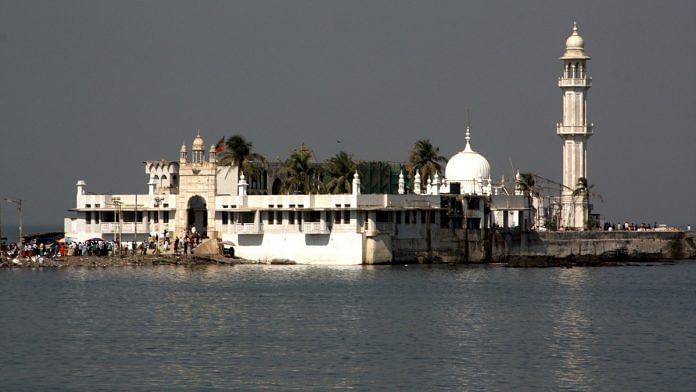Like in Sabarimala temple case, women had to move court to get unfettered access to Haji Ali Dargah. Now, a separate access path has been created for them.
Mumbai: A young girl wearing a chic blue off-shoulder top and jeans, her head covered with a scarf, ties a thread to a lattice structure with her eyes closed. Next to her, a burkha-clad woman is handing over a chadar and flowers to a male attendant to be offered to the tomb of Pir Haji Ali Shah Bukhari. A few older women with dupattas on their heads are sitting on the side, their eyes closed in meditation and prayer.
This is the sanctum sanctorum of Mumbai’s famous Haji Ali Dargah, where to gain unfettered access, women, like in the case of Kerala’s Sabarimala temple, had to knock on the doors of the court.
It has been about two years since the Bombay High Court paved the way for women’s entry to the sanctum sanctorum of the dargah. The Haji Ali Dargah Trust initially resisted the order and filed an appeal in the Supreme Court, but eventually conceded to giving women access to right up to the place where the tomb is placed.
Women across all faiths and age-groups have been visiting the dargah as well as the sanctum sanctorum smoothly ever since.
Shalu, a Delhi-based student visiting Mumbai, said she visited the dargah for the first time and her experience was “all good”.
Also read: With Sabarimala ruling, Supreme Court is doing its bit to push back patriarchy
“We could go inside. But we couldn’t enter from the front door. There was a door from the side from where we were allowed in. But it’s a good thing that we were being permitted to enter,” she said.
Dedicated access for women
The management of the Haji Ali Dargah has created a separate access path for women to enter the sanctum sanctorum from one side. At the entrance, volunteers request women to wear scarves or dupattas over their heads. Those who are not carrying dupattas are helped with one.
Women carrying chadars, flowers and threads queue up at the sanctum sanctorum and hand over their offerings to a male attendant. The tomb is just metres away, separated by barricades for the male devotees as well.
“Different types of women come here, wearing short clothes, pant shirt, without dupattas, so the entry to women was closed earlier,” said Khwaja Bi, who visits the dargah from her home in Mumbai’s suburban Andheri about two or three times a year.
Also read: Supreme Court cannot become the priest between Indians and their Gods
“But now they have a barricading and dupattas have been kept outside. Their volunteers explain to women politely that they should wear dupattas inside,” she added.
Shabana, who was visiting the dargah with her toddler son, said: “Now, any woman can enter the dargah and the sanctum irrespective of what her religion is. But, she should not touch the tomb.
“Also it is important that women cover their heads with a dupatta. It is a mark of respect,” Shabana added.
Ban on women’s entry came on 2011
The dargah, located on an islet off Mumbai’s coast, is a 587-year-old shrine of Sayyed Peer Haji Ali Shah Bukhari and is not just a revered mosque, but also a major tourist attraction in the city. The mosque is governed by the Haji Ali Dargah Trust, a public charitable trust.
Women were always allowed to enter the sanctum in the Haji Ali mosque, and it was only sometime in 2011 that the trustees decided to deny them access to the grave, saying it was un-Islamic.
A group of women, organised under the Bharatiya Muslim Mahila Andolan (BMMA), noticed the change in rules and tried to hold discussions with the trustees to allow women’s entry to the shrine’s sanctum. They even approached the Maharashtra State Minority Commission and the state minority welfare department, which said they could not intervene in religious matters.
The BMMA eventually filed a petition in the Bombay High Court in 2014 against the discrimination based on gender. The court allowed women equal access in 2016.
Although the trust initially appealed against this order in the Supreme Court, it finally conceded and requested the apex court to grant it some time to have the infrastructure ready for women who would like to enter the shrine. The court granted the trust four months to complete the process.



